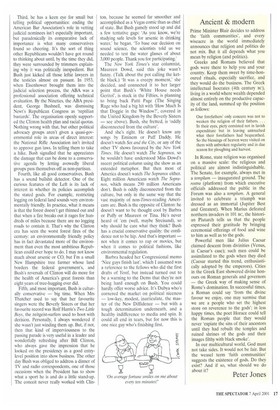Ancient & modern
Prime Minister Blair decides to address the 'faith communities', and every wiseacre in the world immediately announces that religion and politics do not mix. But it all depends what you mean by religion (and politics).
Greeks and Romans believed that gods were there to help you and your country. Keep them sweet by time-honoured rituals, especially sacrifice, and they would do the business. The Greek intellectual Isocrates (4th century BC), living in a world where wealth depended almost entirely on the productive capacity of the land, summed up the position as follows:
Our forefathers' only concern was not to weaken the religion of their fathers. .. In their eyes, piety consisted not in lavish expenditure but in leaving untouched what their forefathers had bequeathed. So the blessings of heaven were visited on them with unbroken regularity and in due season for ploughing and harvest.
In Rome, state religion was organised on a massive scale: the religious and political are almost indistinguishable. The Senate, for example, always met in a templum — inaugurated ground. The rostra (platform) from which executive officials addressed the public in the Forum was also a templum. A general invited to celebrate a triumph was dressed as an immortal (Jupiter Best and Greatest). When Marius defeated northern invaders in 101 BC, the historian Plutarch tells us that the people expressed their gratitude by bringing ceremonial offerings of food and wine to him as well as to the gods.
Powerful men like Julius Caesar claimed descent from divinities (Venus, in Caesar's case); such men could be assimilated to the gods when they died (Caesar started this trend, enthusiastically adopted by the emperors). Cities in the Greek East showered divine honours on Roman generals and governors — the Greek way of making sense of Rome's domination. In successful times, a Roman could say 'from the divine favour we enjoy, one may surmise that we are a people who set the highest store on reverence to the gods'; in less happy times, the poet Horace could tell the Roman people that they would never 'expiate the sins of their ancestors until they had rebuilt the temples and ruined shrines of the gods and their images filthy with black smoke'.
In our multicultural world, God must not take sides. It would not be fair. But the weasel term 'faith communities' suggests the existence of gods. Do they exist? And if so, what should we do about it? Peter Jones


























































 Previous page
Previous page